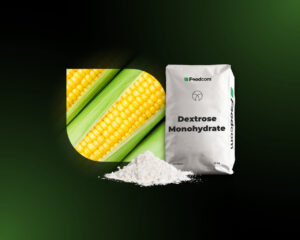- Potato starch prices are increasing due to high demand and anticipated poor harvests impacting supply chains.
- The European Commission is investigating the dumping of Chinese erythritol, which could lead to new tariffs and affect prices.
- Russian forces are accused of targeting Ukrainian wheat fields, intensifying geopolitical conflicts and threatening food supplies.
Welcome to our plant-based newsletter!
This week’s global commodity update reveals crucial developments: potato starch prices are climbing due to expected poor harvests and supply chain issues, the European Commission investigates potential dumping of Chinese erythritol, and the sunflower lecithin market sees strong growth fueled by demand for natural ingredients. Meanwhile, geopolitical conflicts intensify as Russian forces reportedly target Ukrainian wheat fields, and India maintains its sugar export restrictions amidst unpredictable monsoon impacts.
Let’s take a look at what else is happening on the market!
Products of the Week
Potato Starch
Potato starch prices rise, continuing the trend observed in the previous month. This increase is attributed to several factors, including escalating demand from end-use industries, higher raw material costs, and disruptions in supply chains. Additionally, forecasts indicate a poor potato harvest in the upcoming months, which could further strain supplies. Buyers are anticipated to replenish their inventories with fresh produce, leading to heightened market demand and an increase in potato prices.
Erythritol
The European Commission has launched an anti-dumping investigation into imports of Erythritol from China after Jungbunzlauer S.A., the sole EU producer, complained that these imports are being sold at unfairly low prices. This investigation could lead to additional duties on Chinese erythritol in order to level the playing field between imported and locally produced erythritol. If the investigation confirms dumping and its injurious effects on the EU market, consumers and producers could face higher prices for erythritol as duties may be imposed on Chinese imports. The market is currently subject to uncertainty and prices may fluctuate as the investigation progresses.
Sunflower Lecithin Powder
The market for sunflower lecithin is experiencing robust growth, driven particularly by demand in the food and beverage industry, where it is widely used as a natural emulsifier. The market, which is dominated by the powder form, is expected to grow at a CAGR of 6.0% during the forecast period. North America and Europe lead the market size, with Asia Pacific expected to grow at the fastest CAGR of 8% from 2024 to 2031. This increase is due to the rising consumer preference for natural and clean label ingredients, which is driving the use of sunflower lecithin in various applications, including meat processing, where it improves texture and moisture retention.
NEWS
Ukrainian wheat fields targeted in Donetsk region
Russian occupation forces have been accused of deliberately targeting and setting fire to wheat fields in the Donetsk region of Ukraine, according to the State Emergency Service in Donetsk. On July 2, multiple incidents were reported, including a significant fire in a 266-hectare wheat field near Nova Poltavka in the Kramatorsk district, where 50 hectares were destroyed. Similar attacks occurred near Myrnohrad and Hrodivka, with local rescuers managing to extinguish the fires and prevent further spread. These acts are seen as attempts to devastate Ukraine’s bread supply, with emergency services working tirelessly to mitigate the damage.
India to maintain sugar export restrictions until October
India will not reconsider its sugar export restrictions until at least October, according to a government official quoted by Money Control. The decision, influenced by the uncertain progress of the current planting season and unpredictable monsoon rains, aims to stabilize domestic sugar prices. The Indian Sugar Mills Association (ISMA) has requested the government allow the export of 20 lakh tonnes to enhance mill liquidity and ensure timely payments to farmers. The export ban has effectively kept domestic sugar prices from escalating. Further decisions will depend on upcoming plantation data and rainfall outcomes.
![Harvest highlights: your guide to this week’s plant-based buzz! [60th Foodcom PLANT-BASED Newsletter] Harvest highlights: your guide to this week’s plant-based buzz! [60th Foodcom PLANT-BASED Newsletter]](https://foodcom.pl/wp-content/uploads/2024/06/Foodcom_SA_Plant-Based_Newsletter_9-1520x760.jpg)







